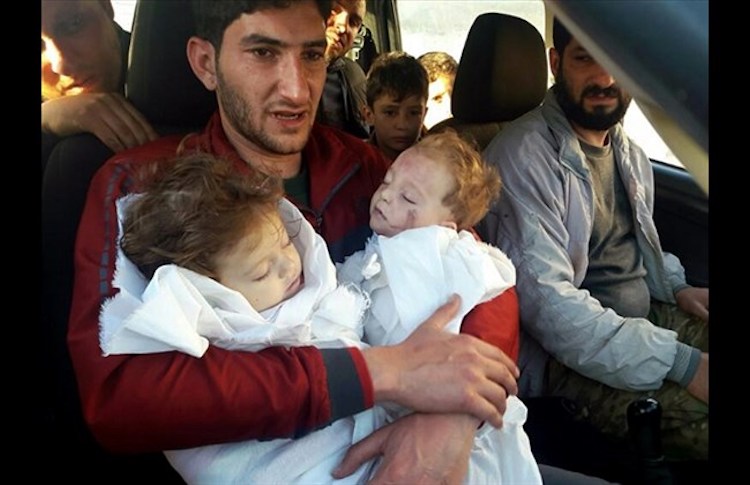By Reinhard Jacobsen
BRUSSELS (IDN) – A panel of experts has bashed the Organisation for the Prohibition of Chemical Weapons (OPCW) for “unacceptable practices” in the investigation of the alleged chemical attack in Douma in Syrian civil war on April 7, 2018. The panel was convened on October 15, 2019 in Brussels by the Courage Foundation, “an international organisation that supports those who risk life or liberty to make significant contributions to the historical record”.
The OPCW is based in The Hague, the Netherlands. The Convention on the Prohibition of the Development, Production, Stockpiling and Use of Chemical Weapons and on their Destruction (the Chemical Weapons Convention or CWC), is comprised of a Preamble, 24 Articles, and 3 Annexes — the Annex on Chemicals, the Verification Annex, and the Confidentiality Annex.
The panel comprising concerned individuals from the fields of disarmament, international law, journalism, military operations, medicine and intelligence, met with a member of the investigation team from the OPCW, the international chemical watchdog.
On this basis the panel issued the following statement:
“Based on the whistleblower’s extensive presentation, including internal emails, text exchanges and suppressed draft reports, we are unanimous in expressing our alarm over unacceptable practices in the investigation of the alleged chemical attack in Douma, near the Syrian capital of Damascus …We became convinced by the testimony that key information about chemical analyses, toxicology consultations, ballistics studies, and witness testimonies was suppressed, ostensibly to favor a preordained conclusion.
“We have learned of disquieting efforts to exclude some inspectors from the investigation whilst thwarting their attempts to raise legitimate concerns, highlight irregular practices or even to express their differing observations and assessments —a right explicitly conferred on inspectors in the Chemical Weapons Convention, evidently with the intention of ensuring the independence and authoritativeness of inspection reports.”
The panel calls on the OPCW to permit all inspectors who took part in the Douma investigation to come forward and report their differing observations in an appropriate forum of the States Parties to the Chemical Weapons Convention, in fulfillment of the spirit of the Convention. “They should be allowed to do this without fear of reprisal or even censure,” insists the panel.
The panel advances these criticisms with the expectation that the OPCW will revisit its investigation of the Douma incident, with the purpose of clarifying what actually happened.
“This would help to restore the credibility of the OPCW and work towards demonstrating its legally mandated commitment to transparency, impartiality and independence. It is of utmost importance to restore trust in the verification procedures relied upon to implement the prohibitions of the CWC,” adds the panel.
The panel members included: José Bustani, Ambassador of Brazil, first Director General of the OPCW and former Ambassador to the United Kingdom and France; Richard Falk, Professor of International Law, Emeritus, Princeton University; Visiting Professor, Istinye University, Istanbul; Kristinn Hrafnsson, editor-in-chief, Wikileaks; John Holmes, Maj Gen (retd), DSO OBE MC; Dr. Helmut Lohrer, MD, Board member of International Physicians for the Prevention of Nuclear War (IPPNW) and International Councilor of its German Affiliate.
Other panel members were Prof. Dr. Guenter Meyer, Centre for Research on the Arab World (CERAW) at the University of Mainz; and Elizabeth Murray, former Deputy National Intelligence Officer for the Near East, National Intelligence (retd) and member, Veteran Intelligence Professionals for Sanity and Sam Adams Associates for Integrity in Intelligence (www.samadamsaward.ch).
The Courage Foundation experts panel’s meeting took place nearly seven months after the OPCW issued a statement on March 1, 2019 based on the final report of its Fact Finding Mission (FFM) regarding the incident of alleged use of toxic chemicals as a weapon in Douma, Syrian, on April 7, 2018.
According to the OPCW, the FFM’s activities regarding this allegation included on-site visits to collect environmental samples, conduct witness interviews and gather data. The FFM further analysed a range of inputs including witness testimonies, environmental and biomedical samples analysis results, toxicological and ballistic analyses, and additional digital information from witnesses.
The evaluation and analysis of all the above-referenced information gathered by the FFM provide reasonable grounds that the use of a toxic chemical as a weapon has taken place on April 7, 2018, added the OPCW statement. This toxic chemical contained reactive chlorine. The toxic chemical was likely molecular chlorine. The report was also transmitted to the UN Security Council through the UN Secretary-General. [IDN-InDepthNews, 28 October 2019]
Photo source: The Daily Star, Lebanon.
IDN is flagship agency of the International Press Syndicate.
facebook.com/IDN.GoingDeeper – twitter.com/InDepthNews

